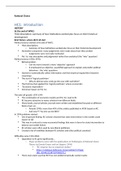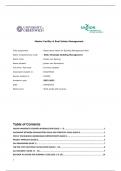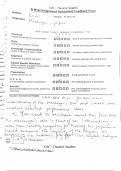Rational Choice
HC1: introduction
HISTORY
At the and of WW2:
Thick description: summary of how institutions worked plus focus on their historical
development.
Brief history; where did it all start
Political science started at he end of WW2:
Thick descriptions
o Summary of how institutions worked plus focus on their historical development
Normative component: many judgements were made about how they worked
o Judgements were not really motivated
Pol. Sci. was descriptive and judgmental rather than analytical (the “why” question)
Political science 1950s-1970s
Behaviouralism:
o Can we move towards a more 'objective' approach
o It emphasized an objective, quantified approach to explain and predict political
behaviour - the 'why' questions
Started to systematically collect information and find empirical regularities (inductive
reasoning)
The start of 'logical positivism'
o Why do democracies rarely go into war with eachother?
The first few that applied this ‘logical positivism’ where economists
“Economic imperialism”
Immense impact on Pol. Sci.
The take-off growth 1970-1994
The combination of economic models and Pol. Sci. lead to RC
RC became attractive to many scholars from different fields
Many books, journal articles, journals were written and established focused on different
fields of pol. sci.
o Around 1990s: more than 40% of the articles published in APSR based on RC.
o And now??? Nu iets van tot 80%?
In 1994 problems started:
One important finding: RC scholars showed that state intervention in the market could
expect to fail
This was in contrast to many economist findings that were in favor for state intervention to
balance out market failure
RC scholars were often used by neo-liberal politicians
Created a lot of hostilities between RC scholars and other political scientists!
Difficulties arise 1994-2004:
Opposition to RC grew significantly...
o Major problems came with the publications of Pathologies of Rational Choice
Theory by Donald Green and Ian Shapiro (1994)
“RC emperor has no empirical clothes”
https://catalogue.leidenuniv.nl/permalink/f/n95gpj/
UBL_ALMA21158733970002711
There main claim was that RCT has not yielded empirically useful results:
,“The discrepancy between the faith that practitioners place in rational choice theory and its failure to
deliver empirically warrants closer inspection of rational choice theorizing as a scientific enterprise”
(Green and Shapiro 1994: 6-7)
Pathalogies
Much of the uproar surrounding the book seems to have been motivated as much by its
confrontational tone as by its substance
Reactions by rational choice scholars:
o M. Fiorina: “working in the vineyards of political science for 25 years, [and] the bulk
of that work is empirical. How could it have prospered otherwise?”
o K. Shepsle: “Don’t let go of something until you have something else to hold on to.”
Do you see any problems in this reasoning?
o Empiricism ≠ Rational Choice Theory ≠ Formal(mathematical) modelling
At the theoretical level, it has neither led to a dismissal of rational choice approaches in this
discipline nor to a complete reorientation
At the empirical level, the book has made rational choice scholars more attentive to empirical
evaluations of their theories
o Under the heading of “Empirical implications of theoretical models” (EITM)
o Further reading: https://onlinelibrary.wiley.com/doi/pdf/10.1111/spsr.12123
We will come back to the criticism after explaining the building blocks
RC in current scholarship
RC has not swallowed Pol. Sci. as a whole but it has definitely not disappeared
It still shapes the Pol. Sci. research agenda
o Especially in the US it's extremely prominent
RC also worked on a better defense against criticisms
o RC responded initially with several papers, books, articles that attacked Green and
Shapiro (1994)
o Some have even argued that RC has softened its assumptions
RC is often confused with:
1. Logical positivism/empiricism
2. Mathematical logic
Some models indeed use these elements, while others are more a 'softer' version
Two types of rational choice model:
o Soft rational choice: without mathematical formalism and certain assumptions might
also be softened
o Hard rational choice: with mathematical formalism
The purpose of rational choice theory is to familiarize you with rational choice models, with
an emphasize on “hard rational choice”
In the last sessions; we see application of softer version
Short introduction to RC
Has many different names: rational choice approach, formal political theory, rational choice
theory, positive political theory, and sometimes even political economy
Some even argue that it is the methods of economics to the study of politics (Mueller 2003:
1)
Deductive reasoning rather than inductive
o We start with a set of a priori assumptions
, We make general models on the basis of these common assumptions
These models we use to predict individual and group behavior
o But is this realistic?
RC models
Models are based on these a priori assumptions
They are abstractions (or simplifications) of the political
world
We test the implications of these rational choice models with real life information
Making assumptions
So unlike many other approaches, RC makes assumptions very clear from the beginning!
Applying RC models
Two things can happen when we employ these RC models:
1. We find evidence that supports our theory
o Our assumptions appears to be correct
2. We find evidence that contradicts our theory
o At least one of our assumptions is wrong
We can often learn more about the world when rational choice theories and assumptions are
wrong, than we can when they are right!
Assumptions
RC are based upon a set of a priori assumptions
Where do these assumptions come from?
Anywhere!
For example: we assume that politicians care about votes or that they care about
making society a better place, or even that they care about making their parents
happy by having a successful career in politics
This makes RC so versatile!
However, there are some assumptions that all RC theories have in common:
Methodological individualism
Rational behavior and utility maximization
HC 2: rational choice theory building blocks 1
Recap lecture 1: history of rational choice
- RC rose to prominence around the 1970, because of thick
description: description not only about physical behaviors but
their context as interpretd by the actors as well
- Intertwined with economics
- Heavily criticized: it says a lot but it is empty.
- RC has not disappeared, but mostly soft versions are used. In
this course the hard versions is used.
Recap: Approach vs theory
RC is more an approach than one theory: there are several ideas and
theories than just one theory. Not one theory but several theories.
, - Social choice theory: a theoretical framework for analysis of
combining individual opinions preferences, interests or welfares
to reach a collective decision or social welfare in some sense.
- Public choice theory: how do individuals make choices if there
is on institutions. Under institutions how do individuals behave.
- Expected utility theory: how can we make a decisions although
you are not sure what the outcome is. Is your decision the best
outcome? Uncertainty.
- Game theory: can we strategy model decisions form individuals
and states. Interaction between rational decisions-makers.
Recap: assumptions
It is based on a priori assumptions which result in deductive models
of political behavior.
Many assumptions can be made, but there are two main
assumptions:
1. Methodological individualism
2. Rational behavior
Methodological individualism
The unit of analysis Is the individual person: the individual is the
core, makes decisions and are affected by the decision.
- Even group actions such as protests are explained by the
actions of individuals. The behavior of groups (Rebel, parties) is
determined by the individuals in that group. this is a contrast
to theories that take the group as the unit of analysis.
- If you talk about states, then RC are talking about the leader of
the state.
- If you talk about protest, RC talks about the members.
- Society: society is the sum of individuals. Society does not
shape individuals, individuals are shaped independently of the
social structure (there is not such a thing as socialization,
constructivism).
- Every analysis must begin with the individual. The individuals
aggregated may come up with how the social, groups, states
work. Bottom-up analysis.
Rational behavior
Rationalilty vs irrationality:
- Irrational has several connotations: crazy, unpredictable, not
the best way to get what you want, not brilliant, not all
knowing. confusing about what the real meaning is.







